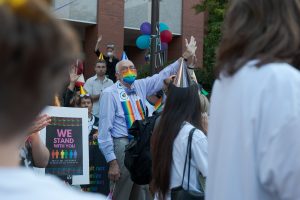‘The Falcon and the Winter Soldier’ brings in new era of MCU
Miniseries tackles racial issues with new generation of Avengers
April 16, 2021

Moving forward is easier said than done, even for Avengers.
Mixing superheroes with current social issues seems to be the new recipe Marvel Studios is trying out; making the new generation of superheroes more appealing and relatable to audiences.
“The Falcon and the Winter Soldier” premiered on Disney Plus on March 19 and picks up where “Avengers: Endgame” left off with Sam Wilson and Bucky Barnes, played by actors Anthony Mackie and Sebastian Stan, trying to move on with their lives after The Blip. Sam is trying to navigate the difficulties of being a black superhero in America and Bucky is adjusting to society after years as the Winter Soldier, a mind-controlled assassin.
In the first two episodes, Sam Wilson (aka Falcon) struggles with being a superhero that his predecessor, Captain America, would be proud of. Despite Captain America practically handing his infamous shield over to him, Sam didn’t believe he deserved it, and refused.
The first episode, “New World Order,” begins with Sam watching the shield being put on display at a museum believing it would be there as a momento, not knowing it would be given to John Walker: a newer, white, but easily disliked version of Captain America.
To add more drama and relevance to the plot, racism is also touched on through experiences and government secrets brought to light, especially in the second episode, “The Star-Spangled Man.” There are currently 5 episodes on Disney Plus, but this episode contains pivotal moments addressing police brutality and racism in America.

Hoping to find more information about supersoldiers, Bucky and Sam visit an old, Black man named Isaiah, a supersoldier for the U.S Military. But compared to how Captain America was treated, no one even knew Isaiah existed. While Captain America was in the spotlight, he was in jail for years.
Isaiah was treated like a test subject rather than a hero; and after seeing him, the pain resonated with Sam.
“You’re telling me that there was a black supersoldier decades ago and no one knew about it?” Sam asked Bucky. During this conversation, Bucky and Sam are approached by police officers in the street, who demand to see Sam’s ID, and ask Bucky if Sam was “bothering him”.
It wasn’t until the officers realized that the two were Avengers that they backed off. This was a powerful moment for viewers and Sam Wilson; it showed that what happened to Sam, who was a hero, happens to a lot of people today.
It is refreshing to see the Marvel Cinematic Universe affirm that it is dangerous to be Black in America, even for a superhero.
With the original Avengers gone, Marvel is slowly introducing the new generation of Avengers to audiences, giving them more focus in the mini series and giving them real-life issues to deal with.
“The Falcon and Winter Soldier” brings a new layer to the MCU, combining epic fight scenes and comedy while also integrating commentary on racism to make a compelling show that will have fans glued to the screen and anxiously looking forward to the release of all six episodes on Disney Plus.



























































































stzgists • May 6, 2021 at 9:45 am
2021 have really been great with movies unlike 2020 I am glad that movie makers have found a way to shoot movies despite the fact that covid-19 is still pretty many restricting things, anyway my best movie so far this year has been Godzilla vs Kong and without remorse and also falcon and the winter soldier I really enjoyed those movies.